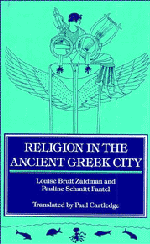Book contents
- Frontmatter
- Contents
- List of illustrations
- Author's preface to the English translation
- Translator's introduction
- List of sources
- PART I Introduction: How should we study Greek civic religion?
- PART II Cult-practices
- 4 Rituals
- 5 Religious personnel
- 6 Places of cult
- 7 Rites of passage
- 8 Settings of religious life
- 9 Religion and political life
- 10 The festival system: the Athenian case
- 11 The Panhellenic cults
- PART III Systems for representing the divine
- PART IV Envoi
- Appendixes
- Bibliography
- Index
7 - Rites of passage
Published online by Cambridge University Press: 05 June 2012
- Frontmatter
- Contents
- List of illustrations
- Author's preface to the English translation
- Translator's introduction
- List of sources
- PART I Introduction: How should we study Greek civic religion?
- PART II Cult-practices
- 4 Rituals
- 5 Religious personnel
- 6 Places of cult
- 7 Rites of passage
- 8 Settings of religious life
- 9 Religion and political life
- 10 The festival system: the Athenian case
- 11 The Panhellenic cults
- PART III Systems for representing the divine
- PART IV Envoi
- Appendixes
- Bibliography
- Index
Summary
INTRODUCTION
In this chapter we shall be discussing the rituals and beliefs relating to critical points in a person's life-cycle, that is, transitions from one life-status to another – birth, attainment of majority, marriage, death. ‘Domestic (or family) religion’ and ‘popular religion’, the labels usually employed to cover these, do not seem satisfactory to us. The former is inadequate, because the rituals in question are as much civic as domestic, and the cleavage familiar today between private and public life has hardly any meaning in a context where matrimonial and funerary rituals were a matter of concern to the community at large, not just the few individuals immediately involved. As for ‘popular religion’, despite its currency among historians of religion at the beginning of this century and its recent revival by English-speaking writers, the term both is excessively vague and corresponds to no ancient Greek notion. M. P. Nilsson, for example, lumped absolutely everything concerning religion under this rubric, while other exponents of the ‘popular religion’ category assert or assume an untenable contrast between the ‘spontaneous’ actions and rituals of the masses and the sophisticated religious thought of the élite.
It need hardly be added that such a conception of Greek religion is the end-product of centuries of ‘Christianocentricity’ and has nothing whatsoever in common with our outlook. We have adopted rather an anthropologically inspired approach that brings out the peculiar logic underlying irreducibly alien rituals and beliefs.
- Type
- Chapter
- Information
- Religion in the Ancient Greek City , pp. 63 - 79Publisher: Cambridge University PressPrint publication year: 1992



